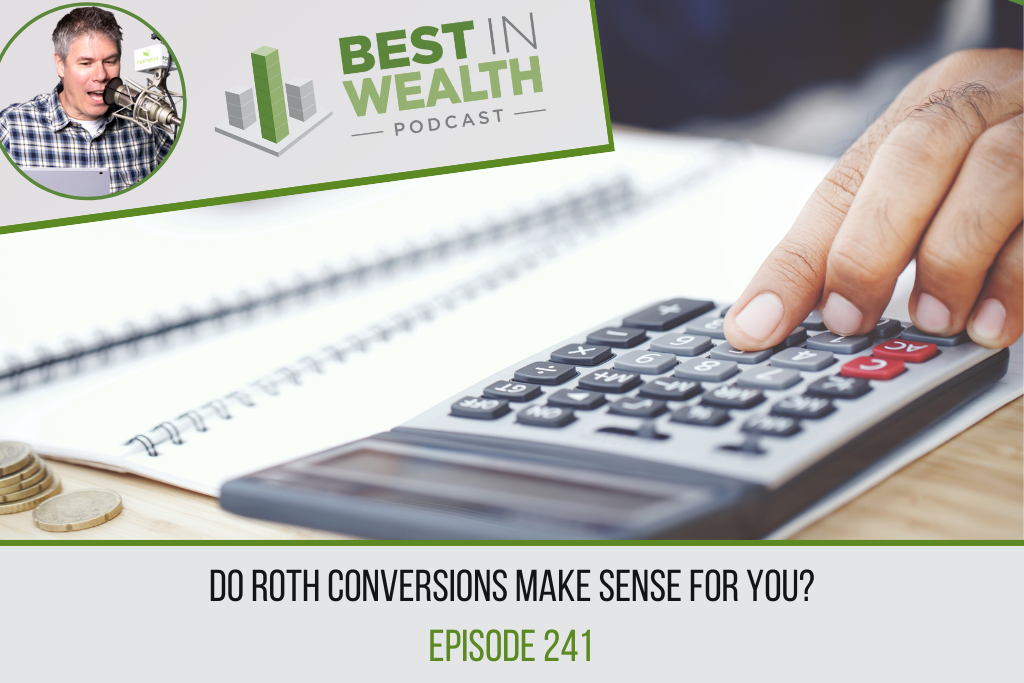Do Roth Conversions Make Sense For You? Ep #241

What is a Roth conversion? Should you do a Roth conversion? When is the best time to do a Roth conversion? If questions like these have been circulating in your mind, this is the episode for you. I will break down when doing a Roth conversion might make sense for you (and why your CPA might not like it) in this episode of Best in Wealth.
What is a Roth conversion? Should you do a Roth conversion? I share my expert opinion in this episode of Best in Wealth! #wealth #retirement #investing #PersonalFinance #FinancialPlanning #RetirementPlanning #WealthManagement Click To TweetOutline of This Episode
- [1:03] There are some great CPAs out there
- [3:56] What is a Roth 401K or IRA?
- [7:41] Should you do a Roth conversion?
- [9:37] When to do a Roth conversion
- [13:37] Why you should work with a financial advisor
Understanding Roth conversions
Your money is either taxable, tax-deferred, or tax-free. Taxable money might be held in a savings account or brokerage account. You may collect interest and dividends. Taxes are due in the year those things happen.
Tax-deferred accounts are traditional IRAs, traditional 401Ks, and other retirement plans. You’re contributing money to get a tax break. The money grows and you have to pay taxes on the earnings you make.
A tax-free account—like a Roth IRA or 401K—means you contribute after-tax money. You also do not pay taxes on the distributions (because you already paid the taxes).
You can convert some of a traditional IRA or 401K and convert it into a Roth account. But all of those dollars are taxable. If you make $100,000, a Roth conversion might land you in the 22% tax bracket (and likely the next one or two brackets above that).
It may not be wise to do a large Roth conversion when you make a good amount of money. So when should you?
Should you do a Roth conversion?
If you have deferred money in a Roth IRA, you can do a conversion. But should you? When would you consider it? There’s no easy answer and it will be different for everyone. But there are some circumstances in which it might be better.
For example, if you lost your job, took a sabbatical, or did not earn as much money and you are in a low tax bracket because of it, it might be a great time to do a Roth conversion. If your income level is lower, you can convert some over at a lower tax rate than when you made the contribution.
Should you do a Roth conversion? I break down why it’s not a one-size-fits-all answer in this episode of Best in Wealth! #wealth #retirement #investing #PersonalFinance #FinancialPlanning #RetirementPlanning #WealthManagement Click To TweetRoth conversions cannot be undone
Before doing a Roth conversion, consult with a CPA or Financial Advisor. Why? Because it cannot be undone. Let’s say you are taking a sabbatical or recently got laid off. So you decided to convert $50,000 of your traditional IRA.
But two months later you are offered a job you cannot refuse. You get a sign-on bonus of $100,000. Suddenly you are making $300,000 a year. That $50,000 that was going to be taxed at 10% is now in the 32% tax bracket. Ouch. In the old days, you could move it back—you cannot do that anymore.
So if you are on a sabbatical or lost your job, wait until later in the year before doing a Roth conversion.
When should you do a Roth conversion?
Retirees who have a long runway before receiving social security or taking required minimum distributions and those with large traditional accounts can consider it. If you can live on your taxable account and there is no other taxable income coming in, you can do conversions over years at a lower tax rate. Once you start collecting social security, it can be more difficult to do conversions because it may increase your tax rate. That is why you need to work with a financial advisor.
When should you do a Roth conversion? I share some need-to-know basics in this episode of Best in Wealth. #wealth #retirement #investing #PersonalFinance #FinancialPlanning #RetirementPlanning #WealthManagement Click To TweetWhy you should work with a financial advisor
If you are going to do a Roth conversion, you may have to pay more tax today. But it may save you many dollars down the road. Work with a financial advisor who does holistic tax planning. They will help you plan for today while keeping your eyes fixed on the future you are planning.
At Fortress Planning Group, we use sophisticated tax and income-planning software to gauge what the tax situation will look like now AND in the future. When Roth conversions are done right, it could potentially mean hundreds of thousands of dollars more in your retirement. Listen to the whole episode to learn what I mean!
Connect With Scott Wellens
- Schedule a discovery call with Scott
- Send a message to Scott
- Visit Fortress Planning Group
- Connect with Scott on LinkedIn
- Follow Scott on Twitter
- Fortress Planning Group on Facebook
Audio Production and Show notes by
PODCAST FAST TRACK
https://www.podcastfasttrack.com
Podcast Disclaimer:
The Best In Wealth Podcast is hosted by Scott Wellens. Scott Wellens is the principal at Fortress Planning Group. Fortress Planning Group is a registered investment advisory firm regulated by the US Securities and Exchange Commission in accordance and compliance with securities laws and regulations. Fortress Planning Group does not render or offer to render personalized investment or tax advice through the Best In Wealth Podcast. The information provided is for informational purposes only and does not constitute financial, tax, investment or legal advice.



